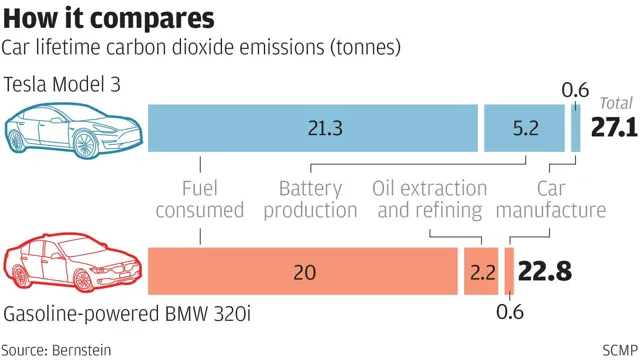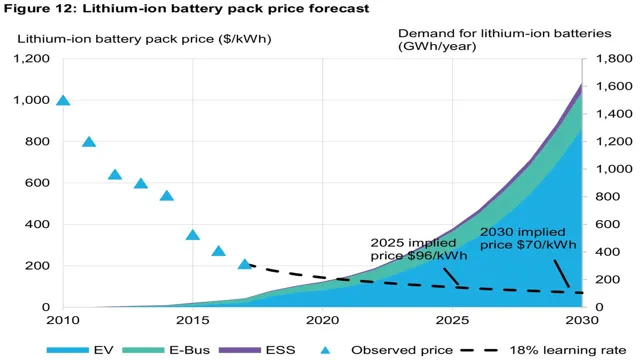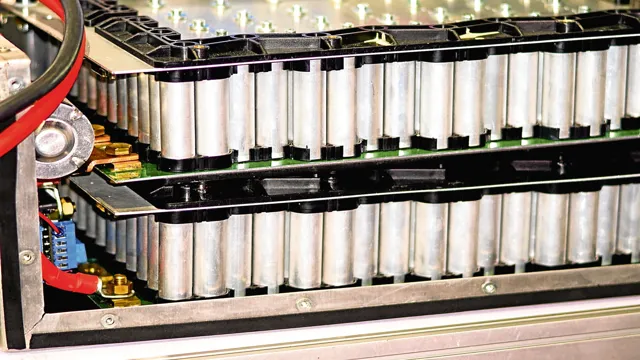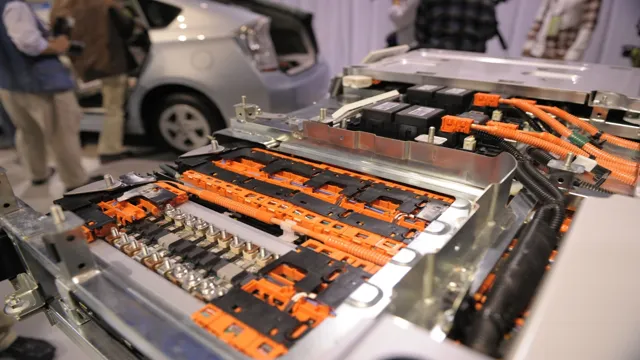Revolutionizing Green Mobility: Exploring the Role of CO2 Emissions in Electric Car Battery Technology
Are you concerned about the impact of CO2 emissions on the environment? Do you wonder how electric car batteries are changing the game when it comes to reducing greenhouse gases? With the growing concern about climate change, many people are turning to electric vehicles as a solution to reduce their carbon footprint. But how exactly do electric car batteries contribute to reducing CO2 emissions? First, it’s important to understand that electric cars don’t emit any pollutants while driving. Unlike conventional cars that rely on fossil fuels, electric vehicles use energy stored in their batteries to power their motors.
As a result, they don’t emit any harmful gases that contribute to climate change. However, the production of electric car batteries does have an impact on the environment. The process requires mining of raw materials such as lithium and cobalt, which can have negative environmental impacts if not managed responsibly.
Additionally, the production of batteries requires a considerable amount of energy, which mainly comes from non-renewable sources like coal and natural gas. Despite these challenges, the benefits of electric cars still outweigh the costs in terms of reducing CO2 emissions. As technology advances, the production of electric car batteries is becoming more sustainable and environmentally friendly.
Companies are investing in research and development to improve the efficiency of batteries, reduce the use of precious metals, and increase the use of renewable energy in production. In conclusion, electric car batteries are a promising solution to reduce greenhouse gases and tackle climate change. While they may not be perfect, they offer a significant improvement over traditional combustion engines.
As consumers and manufacturers alike continue to prioritize sustainability and innovation, we can expect to see even more progress in the years to come.
The Advantage of Electric Cars vs Gas Cars
When it comes to the environment, electric cars offer a clear advantage over gas cars. The main factor is CO2 emissions. Electric cars use a battery to power the engine, and this battery doesn’t produce any emissions.
Meanwhile, gas cars rely on combustion engines that expel CO2 as they burn fuel. By driving an electric car, you can reduce your carbon footprint and help combat climate change. Plus, electric cars tend to be more efficient than gas cars, which means they use less energy overall.
While there are some concerns about the environmental impact of battery production, the benefits of electric cars make them a smart choice for those who care about the planet.
Reducing CO2 Emissions
Electric cars have a significant advantage over gas-powered cars when it comes to reducing CO2 emissions. While gasoline cars emit harmful pollutants, electric vehicles produce zero emissions while driving. This is because electric cars do not have an internal combustion engine, but use electric motors powered by batteries instead.
Furthermore, the electricity used to charge electric cars can come from renewable sources, such as wind or solar power, further reducing emissions. In addition to being environmentally friendly, electric cars can also save you money in the long run. While the initial cost of purchasing an electric car may be higher than a gas-powered car, electric cars have lower operating costs and require less maintenance.
This is because electric cars do not have as many moving parts as traditional cars, which means fewer parts to wear out and break down. Plus, the cost of electricity to drive an electric car is much less than the cost of gasoline. One other advantage of electric cars is their quiet operation.
Because they do not have an internal combustion engine, electric cars run quietly and smoothly. This makes for a more pleasant driving experience, especially in urban areas where traffic noise can be overwhelming. Additionally, electric cars provide instant torque, meaning they accelerate quickly and smoothly.
In conclusion, switching from a gas-powered car to an electric vehicle is an excellent way to reduce CO2 emissions and help protect the environment. They also offer several other benefits, including lower operating costs, less maintenance, and a quieter, more comfortable ride. With advancements in battery technology and infrastructure, electric cars are becoming more accessible and convenient than ever before.

Electric Car Batteries vs Fossil Fuels Vehicles
Electric Car Batteries vs Fossil Fuels Vehicles Electric cars have numerous advantages over gas cars, one of which is their batteries. Unlike fossil fuels vehicles that require constant refueling, electric cars are powered by batteries that can be recharged at charging stations. This means that you don’t have to visit a gas station frequently, saving you both time and money.
Moreover, electric car batteries have proven to be more efficient than gas engines in terms of energy conversion and emission reduction. They produce zero tailpipe emissions, which means they are environmentally friendly. Additionally, electric car batteries are quieter than gas engines, making them less disruptive to the environment and communities around them.
In general, electric car batteries offer a more sustainable, convenient, and eco-friendly solution to transportation than fossil fuels vehicles. As technology continues to advance, these batteries will only become more efficient and reliable, further enhancing the benefits of electric cars for everyone.
A Closer Look at CO2 Emissions in Electric Cars
When it comes to electric cars, one of the biggest selling points is their lower CO2 emissions compared to traditional gasoline-powered vehicles. However, the manufacturing process and battery production still contribute to their overall carbon footprint. The good news is that over the lifetime of an electric car, the lower emissions from driving can surpass the initial carbon footprint.
Additionally, advancements in battery technology and production methods are continually reducing the amount of CO2 emitted during the manufacturing process. So, while electric cars may not be completely emission-free from start to finish, they are still a much more environmentally friendly option compared to traditional cars, especially as renewable energy sources become more prevalent. By choosing an electric car, you are making a positive impact on the environment and taking a step towards a more sustainable future.
Comparing Model Types and Emissions
As we shift towards a more sustainable future, electric cars are becoming a popular choice for those looking to reduce their carbon footprint. However, not all electric cars are created equal when it comes to CO2 emissions. The type of car model and its energy source can play a significant role in determining emissions.
For example, a hybrid car, which combines an electric motor and internal combustion engine, may emit less CO2 than a purely electric car if the source of electricity is a coal-fired power plant. This is why it’s important to consider both the car model and the source of energy when looking to make more sustainable transportation choices. By doing our research and making informed decisions, we can make a positive impact on the environment without sacrificing our mobility.
Factors That Impact CO2 Emissions
Electric cars have been touted as a solution to reducing carbon emissions and improving our environment. However, the impact of these vehicles on CO2 emissions is heavily dependent on various factors. For instance, the origin of the electricity used to power an electric car plays a significant role in determining the vehicle’s emissions.
If the electricity is generated from renewable sources such as solar or wind energy, then the emissions are minimal. However, if the electricity is generated from non-renewable sources such as coal or natural gas, then the emissions could be significant. It is also essential to consider the entire lifecycle of an electric car, including the production processes and the disposal of the batteries.
While electric cars produce less CO2 emissions than gasoline cars during their use, the emissions generated during the production of batteries may offset the benefits. Overall, the impact of electric cars on CO2 emissions is determined by various factors, and it is crucial to consider the bigger picture before reaching a conclusion.
Lifecycle Analysis of Electric Car Batteries
Electric Car Batteries When it comes to electric cars, one common concern is the production and disposal of their lithium-ion batteries. While it’s true that the manufacturing process can produce significant amounts of carbon dioxide emissions, studies have shown that the long-term benefits far outweigh the initial environmental impact. In fact, electric cars have been found to emit less carbon dioxide over their entire lifespan than traditional gas-powered cars.
This is due in part to the fact that electric cars don’t produce any emissions while on the road, while gas-powered cars continue to emit pollutants throughout their lifetime. Additionally, many electric car manufacturers are working to reduce the carbon footprint of their battery production by using renewable energy sources and improving production methods. While there’s still room for improvement, it’s clear that electric cars and their batteries have the potential to significantly reduce our carbon emissions and help combat climate change.
The Future of Electric Car Batteries and CO2 Emissions
CO2 emissions from vehicles have become a major issue in recent times. However, with the rise of electric cars, this is quickly changing. The future of electric car batteries looks bright, and with it, the hope of reducing CO2 emissions.
Advancements in technology have allowed for the production of more efficient and energy-dense batteries, which has led to longer driving ranges and faster charging times. This means that electric cars are becoming more practical for everyday use, which bodes well for the future. Furthermore, as the demand for electric cars increases, it incentivises the production of renewable energy sources to power them.
This creates a positive cycle that can help reduce the negative impact of CO2 emissions. With all of these factors combined, the future looks promising for electric cars and the reduction of CO2 emissions across the world.
Advancements in Battery Technology
The advancements in battery technology have been revolutionary in the realm of electric cars and reducing CO2 emissions. With the emergence of solid-state batteries, electric vehicles will now have the option to increase their range and decrease charging time, making them a more attractive option for consumers. These advanced batteries are also safer and have a longer lifespan, making them a more sustainable option for the environment.
Additionally, the use of recycled materials in the production of electric car batteries further reduces CO2 emissions, making electric cars one of the most eco-friendly options for transportation. As the technology continues to evolve, we can expect to see even more efficient and sustainable battery technology.
Impact on the Environment
As the world continues to shift towards more sustainable practices, the role of electric cars in reducing carbon emissions grows increasingly crucial. However, many wonder about the impact of electric car batteries on the environment. While EVs themselves produce significantly fewer emissions compared to their petrol-based counterparts, traditional battery production methods do produce a considerable amount of carbon.
Fortunately, the future of electric car batteries looks promising, with researchers exploring greener alternatives like solid-state batteries that use no toxic or flammable liquids. Additionally, efforts are underway to increase battery recycling rates, reducing the need for new battery production altogether. These sustainable initiatives will have a significant impact on reducing carbon emissions and safeguarding our planet for future generations.
Conclusion: The Future is Electric
In conclusion, it’s clear that the move towards electric cars is an important step in reducing CO2 emissions. While some may argue that the production and disposal of electric car batteries still have an environmental impact, the benefits of decreased emissions during the car’s lifetime outweigh these concerns. We must continue to prioritize the development of sustainable methods for battery production and recycling, but overall, electric cars offer a promising solution in the fight against climate change.
So let’s charge up and drive towards a brighter, greener future!”
FAQs
How do CO2 emissions from electric cars compare to those of gasoline cars?
Electric cars emit zero CO2 emissions while driving, while gasoline cars emit an average of 4.6 metric tons of CO2 emissions per year.
How does the battery of an electric car impact CO2 emissions?
The production process of the battery for an electric car can contribute to CO2 emissions. However, over the lifetime of the car, the decreased emissions from driving an electric car can outweigh the emissions from producing the battery.
How can drivers reduce the CO2 emissions of their electric cars?
Drivers can reduce the CO2 emissions of their electric cars by using renewable energy sources to charge their cars, carpooling or using public transit when possible, and driving efficiently.
How does the lifespan of the battery impact CO2 emissions from electric cars?
A longer lifespan for the battery of an electric car means fewer batteries produced and less CO2 emissions from the production process. Additionally, a longer lifespan also means less energy required for the disposal and replacement of batteries.




